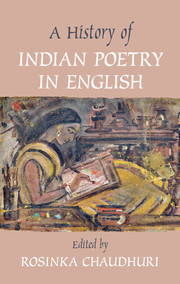Book contents
- Frontmatter
- Contents
- Contributors
- Acknowledgments
- Introduction
- SECTION I THE BROAD NINETEENTH CENTURY: INDIANS IN ENGLISH AND THE ENGLISH IN INDIA
- SECTION II PUBLISHERS, PUBLISHING HOUSES, AND THE PERIODICAL PRESS
- SECTION III POETRY: 1950–2000
- 13 Nissim Ezekiel: Poet of a Minor Literature
- 14 Dom Moraes: A Poet's Progress
- 15 Interpretative Testimony: Kamala Das and Eunice de Souza
- 16 Adil Jussawala and the Double Edge of Poetry
- 17 Arvind Krishna Mehrotra and the Interplay of Languages
- 18 Arun Kolatkar: A Singular Poetry in Two Languages
- 19 Imagery and Imagination in the Poetry of Jayanta Mahapatra
- 20 Modernisms and Modernity: Keki Daruwalla and Gieve Patel
- 21 The Third Generation: Melanie Silgardo and Manohar Shetty
- SECTION IV POETS OF THE DIASPORA
- SECTION V THE NEW MILLENNIUM POETS ON THEMSELVES
- Bibliography
- Index
15 - Interpretative Testimony: Kamala Das and Eunice de Souza
from SECTION III - POETRY: 1950–2000
Published online by Cambridge University Press: 05 March 2016
- Frontmatter
- Contents
- Contributors
- Acknowledgments
- Introduction
- SECTION I THE BROAD NINETEENTH CENTURY: INDIANS IN ENGLISH AND THE ENGLISH IN INDIA
- SECTION II PUBLISHERS, PUBLISHING HOUSES, AND THE PERIODICAL PRESS
- SECTION III POETRY: 1950–2000
- 13 Nissim Ezekiel: Poet of a Minor Literature
- 14 Dom Moraes: A Poet's Progress
- 15 Interpretative Testimony: Kamala Das and Eunice de Souza
- 16 Adil Jussawala and the Double Edge of Poetry
- 17 Arvind Krishna Mehrotra and the Interplay of Languages
- 18 Arun Kolatkar: A Singular Poetry in Two Languages
- 19 Imagery and Imagination in the Poetry of Jayanta Mahapatra
- 20 Modernisms and Modernity: Keki Daruwalla and Gieve Patel
- 21 The Third Generation: Melanie Silgardo and Manohar Shetty
- SECTION IV POETS OF THE DIASPORA
- SECTION V THE NEW MILLENNIUM POETS ON THEMSELVES
- Bibliography
- Index
Summary
Kamala Das was neither a precursor of “women's writing in India” in general, nor of “poetry by Indian women” in particular. Indian Writing has been indelibly marked with writings of Indian women, as a cursory glance through the voluminous Women Writing in India: 600 BC to the Present would show. Why is Das, then, accorded such importance in modern Indian Literature? There have been women poets in India before and after her, but for none of them were their lives and their writing as closely interwoven as in the case of Das. Das's life and her writing flow into, and are an extension of, each other. They are two sides of the same coin. While the life that she lived fed her writing, the writing, in turn, may be said to have fed the life. That is to say, Das chose to live her life in a way that notoriously earned her the label of “confessional poet” and caused her readers (especially heterosexual male readers) to focus on her sexual life. However, while Das has occasionally maintained that her poems have nothing to do with her, but merely a poetic persona that resembles her, she has, in truth, vacillated on the issue, and has sometimes willfully suggested (especially in her autobiography My Story) that the poems are factual and autobiographical.
Kamala Das was born in March 1934 in South Malabar, Kerala, India. She belonged to a matrilineal (if not matriarchal) family, with her mother, Balamani Amma, descended from the royal Nalapat clan. Both Balamani Amma's father and grandfather were maharajas. Das's father, by contrast, was a Nayar, a peasant whose family tilled the soil. The fact that she came from a matrilineal family, with royal blood on her mother's side, would have a bearing on the later Das who always chose to be in control, both as a poet and a human being, except when she voluntarily relinquished it. Das lived her life in Kerala, and in the metro cities of Calcutta, Bombay, and Delhi, alternating among these four locations at different times of her life.
- Type
- Chapter
- Information
- A History of Indian Poetry in English , pp. 235 - 250Publisher: Cambridge University PressPrint publication year: 2016



